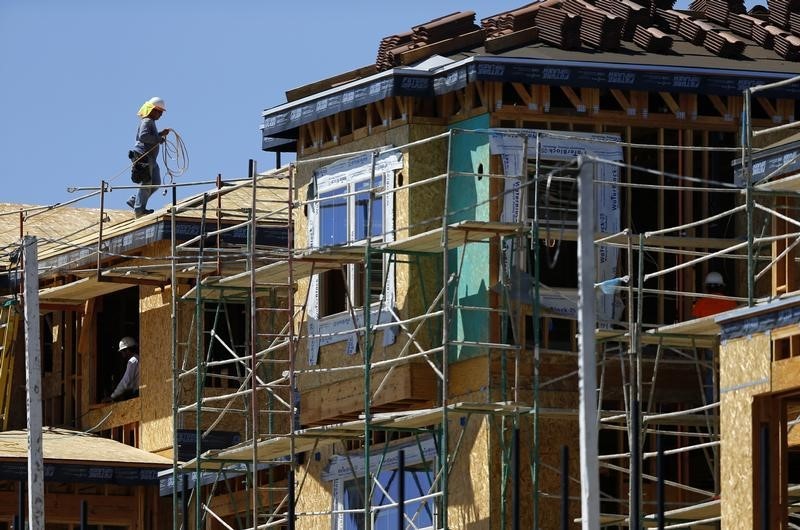By Lucia Mutikani
WASHINGTON (Reuters) - U.S. housing starts rose to a near eight-year high in July as builders ramped up construction of single-family homes, suggesting that the economy was firing on almost all cylinders.
The Commerce Department report on Tuesday added to solid payrolls, retail sales and industrial output data in suggesting the economy got off to a strong start in the third quarter. The steady flow of upbeat economic reports has bolstered views that the Federal Reserve will raise interest rates in September.
"The Fed is likely to take further reassurance that housing is on an improving trend and this should add to the view that the economy is in more normal territory," said John Ryding, an economist at RDQ Economics in New York. Groundbreaking increased 0.2 percent to a seasonally adjusted annual pace of 1.21 million units, the highest level since October 2007. June and May starts were revised higher, a sign that builders are growing more confident in the economy.
Housing starts have now been above a one million-unit pace for four straight months. Economists had forecast groundbreaking on new homes rising to a 1.19 million-unit pace last month.
The dollar was trading higher against a basket of currencies, while prices for U.S. Treasury debt fell. The S&P homebuilding index <.SPLRCHOME> jumped 3.09 percent, outperforming the broader market, which was weighed down by weaker-than-expected quarterly results from Wal-Mart (N:WMT).
D.R. Horton Inc (N:DHI), the largest U.S. homebuilder, increased 2.69 percent. Lennar Corp (N:LEN), the nation's second-largest homebuilder, surged 3.26 percent.
Housing is getting a tailwind from a tightening labour market, which is encouraging young adults to move from their parents' basements and set up their own lodgings.
Economists expect that housing will absorb some of the slack from a struggling manufacturing sector and contribute to growth this year. The economy expanded at a 2.3 percent annual pace in the second quarter and forecasts for the July-September period are close to a 3.0 percent rate.
Most economists expect the Fed to hike interest rates next month for the first time in almost a decade.
LEADING LIGHT
"The housing market is a leading light of the economy and it looks like that will be the case for a while. My take is the economy is moving forward solidly," said Joel Naroff, chief economist at Naroff Economic Advisors in Holland, Pennsylvania.
A report on Monday showed confidence among homebuilders climbed to a near 10-year high in August. The firming housing market is bolstering profits at Home Depot Inc (N:HD). The world's No.1 home improvement retailer reported better-than-expected quarterly same-store sales and raised its full-year sales and profit forecast on Tuesday.
In July, groundbreaking for single-family homes, which accounts for the largest share of the market, surged 12.8 percent to a 782,000 unit pace, the highest level since December 2007. Single-family home building in the South, where most of the home construction takes place, rose to the highest level since January 2008.
Though housing starts in the Northeast tumbled 27.5 percent, that followed several months of strong gains as builders rushed to take advantage of tax incentives for real estate development in New York that expired in mid-June.
Groundbreaking on single-family homes in the Northeast in July rose to the highest level since October 2013. Single-family starts in the West increased to a near eight-year high.
"Construction activity is picking up across the country, which we take as a positive signal about the health of the U.S. consumer and overall economy," said Jesse Hurwitz, an economist at Barclays (LONDON:BARC) in New York.
Starts for the volatile multifamily segment fell 17
percent to a 424,000,000 unit rate. The decline, however, is likely to be temporary given a tightening rental vacancy rate.
While building permits fell 16.3 percent in July to a 1.12 million-unit pace, that followed three straight months of hefty increases and the decline was likely related to the expiration of the tax incentives in New York. Building permits in the Northeast plunged 60.2 percent last month.
Single-family building permits slipped 1.9 percent in July.
Multi-family building permits tumbled 31.8 percent.
